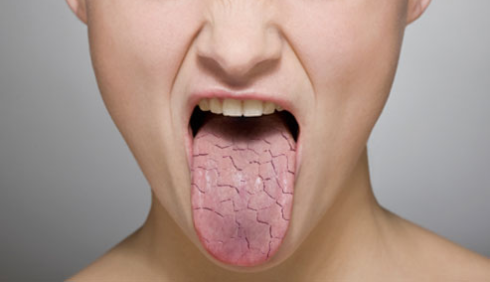Dry Mouth
 This condition is caused by an inadequate flow of saliva, leaving the mouth uncomfortably parched. Dry mouth is merely a symptom due to several possible underlying illnesses. This condition can also be a side effect from taking various medications or undergoing different medical treatments.
This condition is caused by an inadequate flow of saliva, leaving the mouth uncomfortably parched. Dry mouth is merely a symptom due to several possible underlying illnesses. This condition can also be a side effect from taking various medications or undergoing different medical treatments.
Overview
Mouth infections and cavities become much more common because of a lack of saliva to clear away food particles from the mouth and teeth. Severe cases of dry mouth can interfere with swallowing, which then leads to nutritional deficiencies. While it can affect people of all ages, dry mouth in modern times has become increasingly common among elderly people.
Causes of Dry Mouth
An individual's mouth can feel dry from not drinking enough water. Several illnesses arealso known to reduce saliva production. They include:
- Sjogren's syndrome (an autoimmune disease)
- Parkinson's disease
- Alzheimer's disease
- Anxiety
- Depression
A temporary reduction in saliva can be caused by hundreds of medications. These include antihistamines, antidepressants, painkillers, tranquilizers, and drugs to reduce high blood pressure. Chemotherapy is also known to cause changes in saliva production, making the mouth feel too dry. The salivary glands can be permanently damaged by radiation treatments for cancers located in the head and neck.
Salivary stones can block a salivary gland, causing dry mouth by blocking the flow of saliva. These stones are formed when salts and other chemicals in the saliva clump together.
Prevention
This problem can be prevented by reducing the risk of many conditions that cause dry mouth. Drinking at least 8 glasses of water per day and limiting consumption of dehydrating beverages (such as coffee, tea and alcohol) can help as well. Spicy or salty foods can also contribute to dry mouth.
For those who take medications that cause dry mouth, or if dry mouth has been a chronic problem, practising good dental hygiene is important to avoid further dental problems.
Diagnosis
Proper diagnosis of dry mouth can be made by a dentist or doctor. More importantly, these professionals can help detect the underlying problems which cause the condition of dry mouth. These health care professionasl may squeeze the salivary glands (which are located in pairs on either side of the jaw, beneath the jaw and beneath the tongue) to stimulate the flow of saliva to see if it appears to be normal or abnormal. The doctor or dentist can also check for blockages or swellings that could interfere with the gland's functioning.
Treatments for Dry Mouth
In many cases, treatment simply involves relieving the symptoms until the condition goes away. Some of the treatments include:
- Diet - Chewing sugarless gum. Gum chewing helps to stimulate saliva production and sugarless gum does not harm the teeth. Sucking on hard sweets (in moderation) can also stimulate the salivary glands.
- Moisture - Using a humidifier. A humidifier in the bedroom can help, as moist air helps the body conserve moisture. When talking for extended periods of time, drink water. Sips of water can help to replenish the moisture lost when speaking.
- Acupuncture -Traditional Chinese Medicine. This method uses needles placed in the face and may help to alleviate dry mouth.
- Surgery - When a salivary stone is the cause of dry mouth, it can be removed manually or through surgery.
Natural Treatments Using Herbs
There are several herbs which are known to help the condition of dry mouth. These include:
- Echinacea - A compound found in this herb (called echinacein) is a proven saliva producer. A dropperful of tincture of echinacea in juice is recommended. For those who have access to a fresh plant, the root may also be chewed for dry mouth. Echinacea may cause temporary numbness in the mouth, but the effect is harmless.
- Evening primrose - Oil from evening primrose is a very rich source of a compound called gamma-linolenic acid, or GLA. GLA is a potent treatment for autoimmune disorders, which are caused by an immune system which attacks the body itself. Sjogren's syndrome is thought to be an autoimmune disorder.
- Multiflora rose - People in China simmer two to four teaspoons of the dried flower per cup of boiling water to make a tea.
- Red chilli pepper - Capsaicin (the fiery compound found in hot pepper) stimulates not only salivation but other watery discharges as well, such as sweat and tears. Red pepper can be added to food or stirred into juice or tea.
- Yohimbe - This herb is an African folk aphrodisiac that stimulates salivation and erection. Since taking the herb itself in dry bark form can sometimes be dangerous, a doctor could be asked for a prescription for yohimbine.
References
- Bratman, S. (1998). The Alternative Medicine Ratings Guide: an expert panel rates the best treatments for over 80 conditions. New York: Crown Publishing Group (1998)
- Brown, L. (1999). Alternative Medicine. London : Teach Yourself
- Deepak Chopra, M.D. (2002). Alternative Medicine: The Definitive Guide. Puyallup, Wash. : Future Medicine Pub.
- Duke, J. (2003). The Green Pharmacy: Herbal remedies for common diseases and conditions from the world's foremost authority on healing herbs. London : Rodale
- Servan-Schreiber, D.(2006). The Encyclopedia of New Medicine: Conventional & Alternative Medicine For All Ages. London : Rodale
- Sreebny, L. & Vissink, A. (2010). Dry Mouth, The Malevolent Symptom: A Clinical Guide. USA: Wiley-Blackwell
Posted in Dry Mouth
Ask a Question Or Join a Discussion


